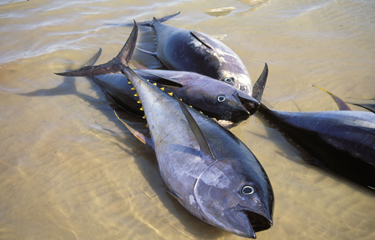A special session of the Indian Ocean Tuna Commission (IOTC) ended on Friday, 12 March, with the regulatory organization punting on any decision to further reduce limits on yellowfin tuna fishing.
According to environmental non-governmental organization WWF, IOTC member-states failed to agree on a proposal that would have implemented a 20 percent cut in regional yellowfin tuna catches compared to 2014 levels.
At the four-day meeting, which took place 8 to 12 March, the proposal was debated, but did not receive the unanimous support required for implementation. It had been backed by a coalition of more than 100 NGOs and seafood companies, including the Global Tuna Alliance, the Tuna Protection Alliance, and the International Pole and Line Foundation (IPNLF). Instead, member-states opted to delay any decision on yellowfin catch limits until the IOTC’s annual meeting in June.
One of the world’s most economically important fishing areas, spanning 70 million square kilometers, the Indian Ocean is responsible for up to 20 percent of the global production of tuna, according to IPNLF. However, concerns have grown over the long-term sustainability of the Indian Ocean’s tuna stocks, particularly its yellowfin resource, which has been classified as overfished since 2015 and has been part of a rebuilding plan since 2016.
WWF Global Tuna Lead Marcel Kroese called the lack of action at the IOTC meeting “disappointing,” saying it will result in the Indian Ocean’s yellowfin tuna population remaining overfished for another year.
“WWF is deeply disappointed by the reckless disregard for the consequences of the failure to put in place much-needed catch limits for yellowfin tuna stocks in the Indian Ocean. Hiding behind the excuse of ‘a lack of data,’ IOTC member-states are pushing yellowfin to the brink – and threatening the livelihoods and food security of millions of people across the Indian Ocean,” Kroese said in a press release. “Current data may be incomplete, but we know enough to know we have to do better, and we don’t have much time to get it right.”
A reported lack of data from the region’s artisanal fisheries was cited as a sticking point in negotiations, according to WWF. International Seafood Sustainability Foundation President Susan Jackson previously told SeafoodSource global restrictions and lockdowns due to COVID-19 have disrupted the flow of relevant fishing data to regional fisheries management organizations and governments, though she called for the IOTC to move forward with yellowfin conservation measures “to ensure an effective rebuilding plan for vulnerable yellowfin tuna stocks.”
WWF Indian Ocean Tuna Manager Umair Shahid said the IOTC has two yellowfin tuna generations – approximately 10 to 15 years – to implement a rebuilding plan in order to avoid a population collapse.
“Time is fast running out for this to happen,” Shahid said. “We advocate caution for any fishery when it enters overfished status, particularly when – as is the case with Indian Ocean yellowfin tuna – there are aggravating circumstances such as high juvenile mortality, the largely uncontrolled use of fish aggregating devices, and lack of accurate catch data. Without addressing these, we are on a countdown to stock collapse.”
Several seafood retailers have made moves away from selling yellowfin tuna sourced from the Indian Ocean over concerns about the sustainability of fishing practices used in the region. In December 2020, United Kingdom-based retailer Co-op pledged to not sell any own-brand or branded yellowfin tuna in its stores until stocks in the Indian Ocean are managed sustainably, and other retailers followed suit.
Photo courtesy of WWF







